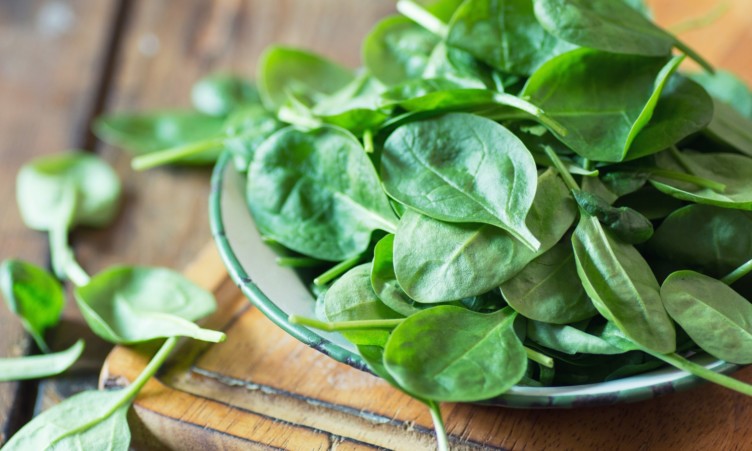- Vitamin K is a fat-soluble vitamin that helps activate different proteins that perform essential functions in the body.
- Vitamin K benefits include supporting bone health, heart health and normal blood clotting.
- Bulletproof Vitamins A-D-K is an easy way to get a science-backed dose of vitamin K, plus complementary vitamins A and D for daily wellness.
While vitamin D and vitamin C get discussed far more often, there’s an underappreciated nutrient that deserves more attention: vitamin K. There are two types of this fat-soluble vitamin, each serving unique roles in supporting bone health, heart health and normal blood clotting.
Since it’s not easy to obtain from food alone, taking a vitamin K supplement can help fill in any gaps. Learn more about how this nutrient works, where you can get more of it and how a vitamin K supplement benefits your bone and heart health.
How vitamin K works

Vitamin K is a fat-soluble vitamin originally named because it plays a part in blood clotting, or coagulation. In fact, the “K” comes from the German word “koagulation.”[1]
Its main function is to help activate a dozen or so different proteins that perform necessary functions in the body. This means that these proteins are in their inactive forms until vitamin K comes along and activates them for use.
The two types of vitamin K
There are actually forms of vitamin K: K1 (phylloquinone) and K2 (menaquinones). So how do they differ?
K1 is the form that we most often get in our diet and is particularly high in green leafy vegetables. On the other hand, K2 is more long-lasting in the body and is made by some bacteria in the gut. In the diet, you’ll find it mostly in animal liver, fermented foods, meat and dairy. Both forms of vitamin K help regulate blood clotting, and your body uses what vitamin K it has in it to take care of this important function first. Vitamin K2, as explained below, has special functions in both the bone and arterial tissue to help keep bones strong and arteries flexible.
K2 includes a family of 13 molecules called menaquinones (MKs), and of these, MK-4 and MK-7 are the most significant. In other words, look for those two when deciding on a quality supplement.
MK-7 is the more biologically active form of K2, with a half-life of three days, making it easier to build consistent blood levels.[2] MK-4 has a half-life of about an hour, and you can only find it in foods (organ meats, muscle meat and other animal products) or as a synthetic supplement (we don’t yet know how to isolate MK-4 from natural food sources). You can find both MK-4 and MK-7 in most quality vitamin K supplements.
Vitamin K benefits

When it comes to the effects of vitamin K, there are several ways this micronutrient can benefit your body. From your bones to your heart to your blood, here’s how vitamin K plays a big role in your health:
- Stronger bones: K2 promotes calcium getting into your bones. Your bone-building protein osteocalcin depends on vitamin K to bind calcium for transport into your bones. This boosts mineralization and keeps bones strong.[3] This is especially important for older adults who are at higher risk of bone loss or osteoporosis.
- Supports heart health: Vitamin K2 also has a very important physiological function to activate a protein that binds up calcium in the arterial neighborhood, which is important in maintaining normal arterial flexibility. So taking a vitamin K supplement benefits not only your bones but also your cardiovascular health!
- Assists with wound healing: If you get a cut, say thanks to vitamin K for helping it clot up to stop any excessive bleeding and start the healing process. That’s why it’s important for people on blood thinners (used to prevent blood clots) to get enough vitamin K from food and supplements, as K1 supports normal blood clotting.
Related: Krill Oil vs. Fish Oil: What to Know About Omega-3 Fatty Acids
What are optimal vitamin K levels?

Humans used to get high doses of vitamin K from certain fermented foods and organ meats, but most people don’t eat either anymore, at least not consistently. For optimal levels, adult males need about 120 micrograms (mcg) per day, while adult females need about 90 mcg. [4]
Severe vitamin K deficiencies are rare. However, deficiencies are more common if you’re taking vitamin K antagonists, if you have significant liver damage or liver disease or if you have a fat malabsorption disorder like inflammatory bowel disease or cystic fibrosis.[5] Of course, if you are taking a medication that antagonizes vitamin K, it is imperative you work with your healthcare professional prescribing that medication before and during any changes in vitamin K intake.
That said, most people could benefit from increasing their vitamin K levels. Even though it’s a fat-soluble nutrient—meaning it’s usually more likely to get stored in the body—you actually only store small amounts of vitamin K. If you don’t get enough of this vitamin in your diet regularly, your supply will deplete quickly.[6]
How to get more vitamin K in your diet

Spoiler alert! It’s not so easy to get enough vitamin K strictly through your diet.
While it can be challenging to find foods that qualify as good sources of vitamin K1, here are some you can include on your shopping list:
- Green leafy vegetables, including collard greens, turnip greens, Brussels sprouts, spinach and kale
- Soybean, canola and olive oil
- Some fruits such as grapes and blueberries
Although it sounds easy to add those foods to your grocery list, the absorption rate of K1 from foods is significantly lower than in its free form (as a dietary supplement), which is about 80%.
Foods that contain vitamin K2 are much more limited. They include:
- Natto (traditional Japanese food made from fermented soybeans)
- Meat, dairy foods and eggs (in small amounts)
The amount of K2 in these foods all depends on the bacteria strains and fermentation process, making it difficult to know whether you have an adequate intake of K2.
How to get more vitamin K from supplements

Although dietary intake of vitamin K is ideal to strive for, it can be hard to come by through food sources alone. Before you begin supplementing, seek medical advice from a healthcare professional to ensure your vitamin K levels constitute a need for a dietary vitamin.
Too much vitamin K can result in toxicity (although rare), potentially causing side effects such as jaundice and anemia. It’s also important to check that a vitamin k supplement won’t interfere with medications, such as anticoagulants.
Like many nutrients, vitamin K works best when you take it with other fat-soluble vitamins and other cofactors. That’s what makes Vitamins A-D-K a smart addition to your daily stack. So how exactly does this all happen?
Vitamin K works most closely with vitamin D for bone health and arterial health.[7] Where vitamin D raises blood levels of calcium, mostly by increasing calcium absorption through the gut, vitamin K helps make sure that calcium makes it to where it is supposed to, especially in terms of the bones. Studies show that taking vitamin K as a supplement activates a bone-building protein, which taken together with vitamin D, helps to maintain strong bones.[8]
On the other hand, supplemental vitamin K activates a vitamin K-dependent protein that helps manage the amount of calcium that is allowed to be deposited in arteries, helping to maintain vascular tissues and optimize blood vessel elasticity. And vitamin D is gaining more and more attention for its importance in maintaining heart health, too. [9]
It just makes sense to keep these two partners of bone and heart support together in a multivitamin supplement so that you get all their benefits. In fact, to ensure that the bases are all covered it is a good idea to make sure that you get an adequate daily intake of all four fat-soluble vitamins: A, D, E and K.
Related: Benefits of Vitamin D and How to Get More of It
Additional vitamin K supplementation tips
To get the most out of your vitamin K supplement, here are some other factors to keep in mind:
- Build a stack: Magnesium, zinc, and boron may help with vitamin D and K absorption and use. You can find some vitamin D supplements with these cofactors already included.
- Consider medications you’re on: If you take blood-thinning medication like Coumadin (warfarin), talk with your healthcare provider before supplementing with vitamin K.
- Eat your fat: For maximum absorbability, always take vitamin K and other fat-soluble vitamins with a fat source. (Hello, Bulletproof Coffee!)
Want to maximize the benefits of supplementing with vitamin D? Discover the best time to take it and why it matters.
Join the Bulletproof Revolution
Sign up for early access to sales, product launches, the latest Bulletproof news and more!


Your point of view caught my eye and was very interesting. Thanks. I have a question for you.